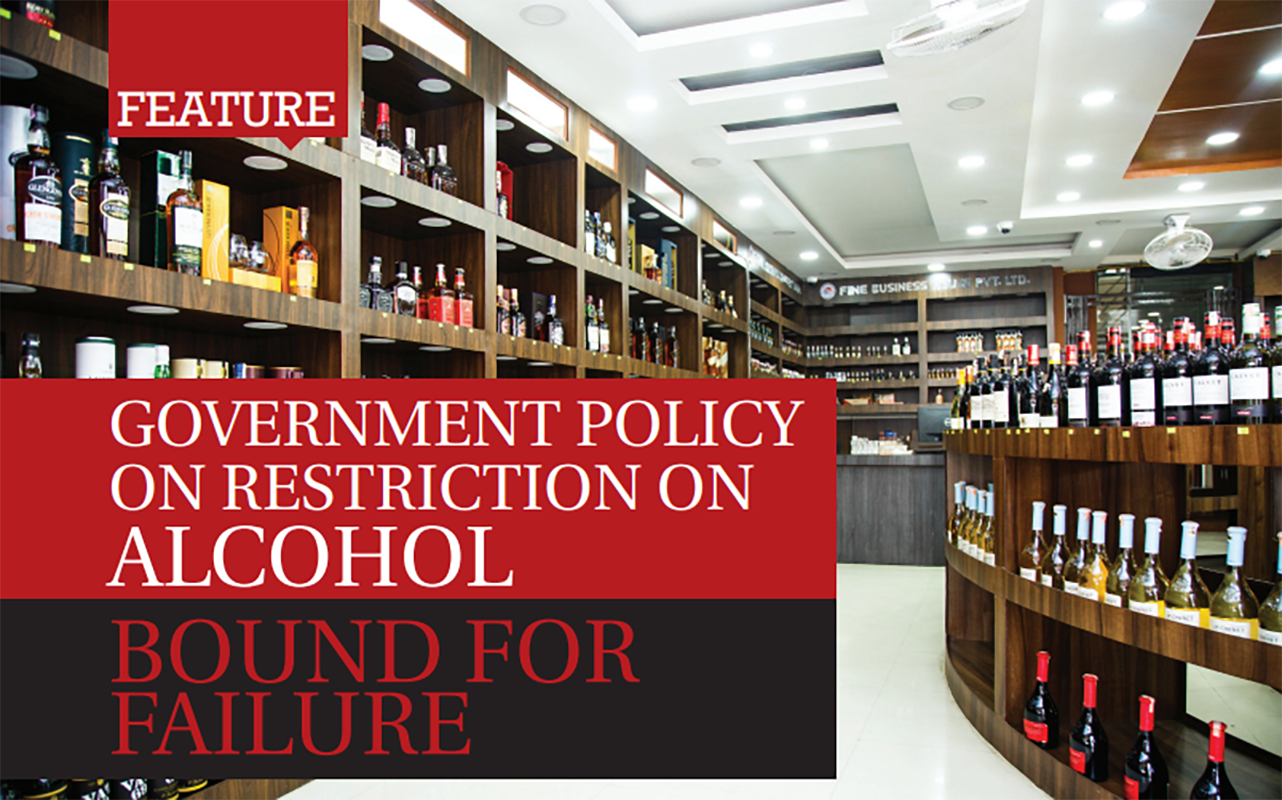
By Avant Shrestha
The nation has an ambivalent relation with alcohol. On one hand, consuming alcohol is deeply ingrained in our religious and cultural ceremonies, and during social and celebratory gatherings. On the other, crime and violence are now being attributed to over-consumption of alcohol. A WHO report has stated that the harmful use of alcohol ranks higher among the factors for diseases, disability and deaths throughout the world. Additionally, lawmakers in Nepal have accepted that most rape cases and gender based violence may be attributed to the consumption of alcohol. Thus the proposed alcohol regulation policy rule and regulation that was stipulated in 2017 and 2018 aims to adopt stricter rules and zero-tolerance when it comes to alcohol. In early 2017, the council of ministers endorsed ‘The National Alcohol Regulation and Control Policy’. The policies aimed to ensure citizens’ right to lead quality life by bringing about improvement in the social, economic and health conditions by reduction in the harmful use of alcohol. However, these policies raise their head once in a while but due to lack of clarity and reason, remain unimplemented.
Features of the proposed National Policy on Regulation and Control of Alcohol – 2017:
- Total ban of alcohol advertisement, promotion and sponsorship.
- Alcohol will only be sold by especially licensed shops for certain hours.
- All alcohol containers will have at least a 75% health warning.
- Alcohol will no longer be used in government-sponsored programs and events.
- Alcohol is no longer allowed to be sold in public places or around heritage sites, educational institutions and sports complexes.
- A statutory warning ‘Drinking is Injurious to Health’ should be prominently displayed.
- People under the age of 21 and pregnant women are barred from purchasing alcoholic drinks.
When made public, the features under the new law were received with mixed sentiment. Furthermore, in late 2018, a new executive order prepared by the Ministry of Home Affairs dubbed as ‘Control of Production, Sale and Distribution of Alcohol’ was suggested. However, this again remains in the gray zone.
Features of proposed Control of Production, Sale, and Distribution of Alcohol:
- Hotels, bars and restaurants to be allowed to sell alcoholic beverages from 5 PM to 10 PM
- Hotels, resorts, bars and restaurants to be barred from serving alcoholic beveragesoutdoor.
- Only two liquor stores to be allowed to operate in a municipality ward.
- Those who have consumed alcohol to be barred from using public transport.
- Liquor stores to be allowed to sell alcohol between 4 PM and 9 PM.
- Liquor producers to be barred from sponsoring sporting events, concerts and other public events.
- Liquor producers to be barred from advertising their products in media or through hoarding boards, posters and pamphlets.
The intention of these policies and regulations may be seen by some as an initiative to address social evil but primarily take away from the citizen the right to use his/her discretion. However, in a country where the liquor business is a huge revenue and employment generator, has the government even taken into consideration the outcome of its proposed policy, or is this an act of aggression with political motives attached to it.
Avash Pandit, Attorney at Gandhi and Associates claims, “Some of these policies do make sense and can lead to positive outcomes but I think these policies are mostly a political move and just too heavy handed.”
“If these policies get implemented, chances are most businesses might not survive,” says Kusang Tamang, Founder and Director of Nepal Craft Beer Distributors. Tamang elaborates, “Nowhere in the world have I heard of restaurants and bars that are allowed to sell alcohol only between 5 PM and 10 PM. Sales will surely drop as the number of customers will decline because lots of bars and restaurants will not be able to operate in such a restrictive environment.”
The ripple effect of this policy will not only be experienced by the liquor industry but by a host of other industries as well. Tourism is bound to take a massive blow. As reported, the Restaurant and Bar Association of Nepal and the Hotel Association of Nepal are under no illusion that tourism will take a big hit. Pandit states, “It is naturally a concern, even today alcohol is such a huge business for restaurants, it’s a huge part of their revenue.”
Pandit states, “There are talks about only one liquor store per ward; what about the ones that have already been given licenses to. Are they supposed to close their business? And who’s going to decide which shops to close? So does this mean the one who has the most lobbying power can keep their store? It seems that the government is trying to create a monopoly and create unhealthy competition environment which will only counteract the positives the policy is supposed to address.”
For manufactures and vendors, it is within their right to produce and sell alcohol and it is within our right to consume it, voice a majority of the public.
The alcohol industry enjoys a stronghold on the national economy; contributing one of the highest revenues year after year. Instead of properly managing and restricting advertisements of alcoholic beverages on various media platform, the policy claims to ban advertisement altogether. This has not been received well by stakeholders within the industry. Santosh Shrestha, President of Advertising Association of Nepal (AAN) says, “If this talk about alcohol advertisement ban is implemented, the advertising agencies and the industry will be severely affected because advertising agencies heavily rely on the revenue generated by these ads. We would be losing a lot.”

The assumption that the advertisement of liquor or alcohol brands results in the increase of overall consumption of the said brand is speculative. In fact, the main motive of an advertisement is to influence buying decisions and not to increase the consumption of a particular product. A consumer may choose to drink a particular brand having been influenced by the brand’s advertisement campaign. “Alcohol is one of those products that would sell without the requirement of advertisements, but what the various forms of advertisement does is that it helps provide information about the product,” expresses Shrestha. When an advertising agency advertises or promotes a product, they generally have the ability to inform the potential consumers about the product; its quality, its price and its process. If the ban is implemented, they do not have the opportunity to make the consumers aware about the product itself.
“Additionally, alcohol companies are much more focused on sponsorship, these sponsorship have assisted lots of cultural and social events and other public and celebratory events, these sectors will be affected as well. When you tie it all down, the loss in revenue will be massive,” expresses Shrestha. “The government’s objective that as soon as advertising goes down, the consumption goes down however will not be the case,” adds Shrestha.
When the entire liquor industry in one way or the other faces restrictions, distributors and consumers will definitely opt for easier solutions. These solutions are not necessarily the best. Pandit explains, “With such policy and restrictions, the black market will thrive. For example, if someone wants to drink a particular brand of beverage, various stipulations will not prevent him or her from drinking. Just because the government made a decision doesn’t mean it will suddenly make people stop drinking; it is only going to take it into the black market.”
Tamang expresses, “In an open market, restricting manufacturing and selling of any given product will give rise to illegal activities. We have seen this in trend in Uttar Pardesh, Bihar and even during the prohibition era in the United States. There will be rise in crime, illicit brewing will become rampant, and most of all the government itself will face hard times because it will lose revenue.”
“To be honest, I don’t see any positive effects of these policies. The government might claim that people will drink less and they will have to spend less on healthcare but people who want to drink will find a way to drink,” expresses Tamang. Instead of a blanket ban on alcohol altogether, the government should be able to launch awareness campaigns on safe and responsible drinking practices. As reported in the daily newspaper, Senior economist Biswo Poudel called the regulation ‘nonsensical’ and predicted that the policy is bound for failure because it has been brought without any homework.
It seems the government’s policy on the restriction of alcohol is less likely to see the day of light. Eventually these policies have all the elements of good intention but at the end lack credible mechanism and actually insult the right of people to exercise their choice on what is good for them and what is not.



-1765706286.jpg)
-1765699753.jpg)

